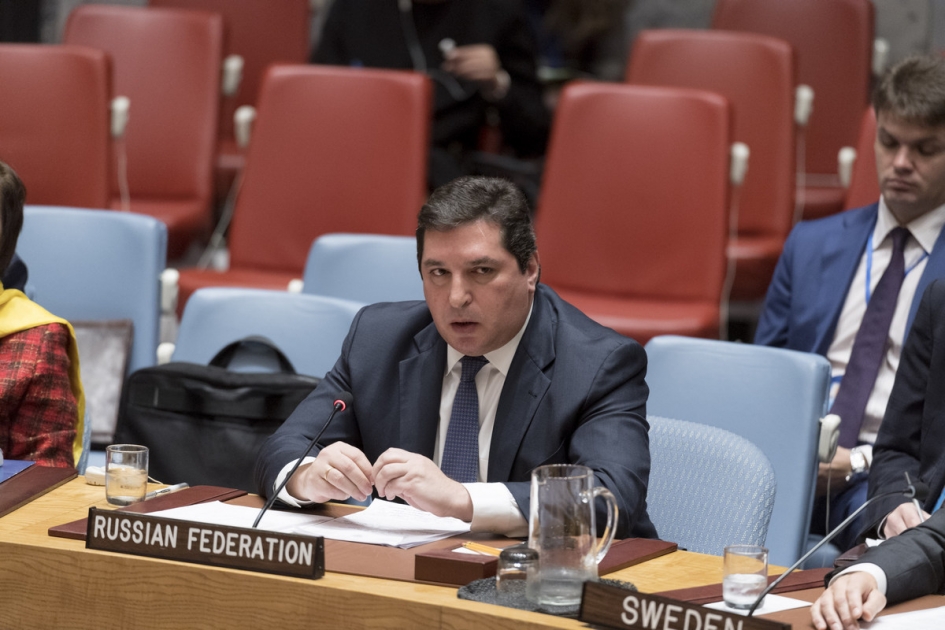Statement by Mr.Vladimir Safronkov, Deputy Permanent Representative of the Russian Federation to the United Nations, at the Security Council on the humanitarian sitiation in Syria
First of all, of course, we want to express our sincere condolences to the Governments and the peoples of the United States and Indonesia in the wake of their recent tragedies.
We thank Mr. Lowcock for his comprehensive briefing. We very much appreciate the work of United Nations humanitarian agencies, particularly when it is conducted impartially in strict observance of the United Nations principles for the provision of humanitarian assistance. Against a backdrop of the successful liberation of large parts of Syria from terrorists, efforts are continuing to restore normal life and return refugees and internally displaced persons to their homes. We must unite to collectively and actively assist in those processes and not to obstruct them on politicized pretexts or with dozens of frankly incomprehensible conditions. The Russian initiative to convene an international conference on Syrian refugees was designed to help unite those efforts. The authorities in Damascus have given security guarantees to those who want to return home and are working on a legal framework that would facilitate their rapid reintegration.
The flow of Syrians returning from Lebanon is increasing. We can see the effect that the opening of the Nasib crossing has had on the Syrian-Jordanian border. People on both sides of the border have been waiting impatiently for several years for this transportation artery, which supports regional, trade and human links, to start functioning again. Such steps deserve every encouragement for the contribution they make to achieving a principle as fundamental to the stabilization of the situation in the Middle East as the establishment of good-neighbourliness.
The implementation of the memorandum of understanding on stabilizing the situation in the de-escalation zone in Idlib based on the high-level Russian-Turkish agreement is proceeding successfully. Our Turkish partners are doing everything they can to get the armed groups and their heavy weapons out of the demilitarized zone. However, the militias based there continue to violate the terms of the agreement by firing on nearby villages, and there are new reports of suspicious movements of Al-Nusra Front members and White Helmets with toxic substances.
We should point out that the de-escalation agreements were temporary from the start, and no one has taken the job of eliminating the terrorist presence in Syria off the agenda. If the provocations by radical elements continue, Russia reserves the right to support effective action by the Syrian Government to eliminate terrorist strongholds. We share the Secretary-General’s concern about the disastrous humanitarian situation in Rukban. And in general, the humanitarian situation in Syria would improve if the coalition stopped violating the Syrian Arab Republic’s sovereignty through its illegal presence, by which I particularly have in mind the well-known Al-Tanf military base in the south of the country and the coalition presence east of the Euphrates.
The economic activity in those illegally occupied areas, without coordinating with the Government of the Syrian Arab Republic, also raises numerous questions generally. Leaders from Russia, Turkey, Germany and France met in Istanbul on 27 October and adopted a joint statement, and we are grateful to the President of Turkey for that important unifying initiative. The summit participants expressed a general disposition to cooperate with a view to further normalizing the situation in Syria, for which the conditions have been established in the framework of the Astana format through the efforts of Russia, Turkey and Iran.
A commitment was expressed to a political settlement under the auspices of the United Nations in accordance with resolution 2254 (2015) and with full respect for Syria’s sovereignty, independence and territorial integrity. Incidentally, the question of collaboration between the Astana process and the so-called small group was also discussed at the Istanbul summit. The importance of getting the work of a constitutional committee started based the decision of the Syrian National Dialogue Congress in Sochi was acknowledged, and we hope that it will be able to start before the end of this year, assuming that the conditions are conducive. The professionals, however, realize that it must be recognized as legitimate by all parties if it is to be efficient and effective. It is important that everyone understands that it is the people of Syria who are responsible for its fate, and it is they who must determine every aspect related to their State’s structure during the course of the dialogue.
After so many years of war, the country will have to undergo a process of national reconciliation, one way or another. And Syria has always been distinguished by a high level of national reconciliation. The United Nations, the international community and Syria’s friends can help, but imposing ready-made solutions, ultimatums or deadlines on the Syrians is wrong and futile. And in any case, the empirical evidence shows that trying to impose solutions in any regional crisis does not work. In answer to the numerous questions that have been directed to us, I would like to inform the members of the Council that the joint statement by the leaders who participated in the quadrilateral summit in Istanbul will be circulated as an official Security Council document in the next few minutes, and I can assure the Council that is contains exhaustive answers.
I thank the Council members who supported the joint statement and thereby affirmed their willingness to work constructively in the quest for a political settlement of the conflict in Syria. I would like to bring to the attention of my colleagues who continue to use terms such as “the Syrian regime” the fact that such usage is contrary to all the relevant Security Council resolutions, which speak only of the Government of the Syrian Arab Republic. A respectful approach is needed, and it would also help to advance the political process.
